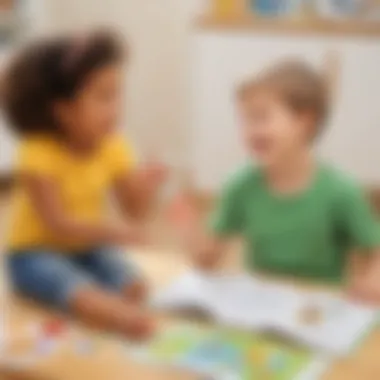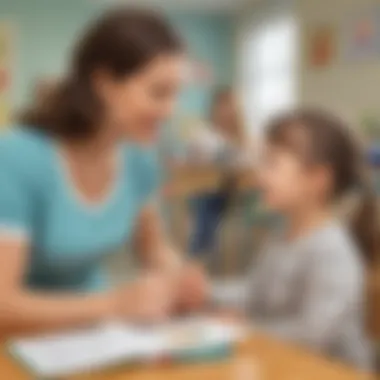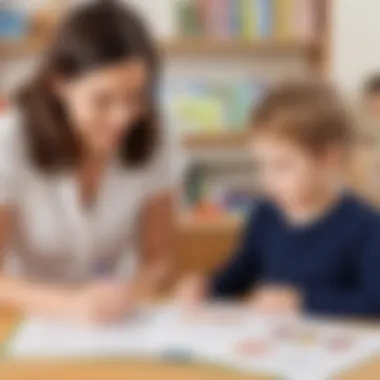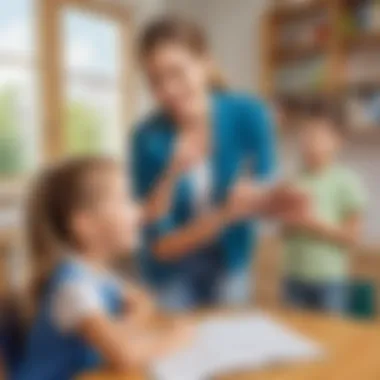Unlocking the Power of Speech Therapy for Kindergartners: A Comprehensive Guide


Creative Activities
Speech therapy for kindergartners goes beyond traditional methods, incorporating engaging and creative activities to enhance communication skills. Craft ideas play a crucial role in this process, offering children hands-on experiences that promote speech development. From creating storytelling puppets to crafting speech sound collages, these activities not only entertain but also educate, aiding in the improvement of language abilities. Step-by-step guides are provided for each activity, detailing the materials needed and the instructions to follow, ensuring easy replication for young learners. The educational value of these creative endeavors is substantial, fostering cognitive skills, boosting vocabulary, and enhancing articulation.
Fun Quizzes
Integrating fun quizzes into speech therapy sessions adds an element of enjoyment and interactive learning for kindergartners. Covering a spectrum of topics related to speech and language development, these quizzes are designed to engage children actively. Question types vary, including multiple choice, fill-in-the-blank, and matching exercises, catering to different learning styles and preferences. Through these quizzes, knowledge reinforcement is achieved, solidifying learning outcomes and improving retention of key linguistic concepts. The quizzes available on Elem Fun serve as effective tools in making speech therapy both educational and enjoyable for young learners.
Fact-Based Articles
Incorporating fact-based articles into speech therapy sessions provides a wealth of information to kindergartners and enriches their language-learning experiences. Covering a diverse range of topics, these articles present complex information in a straightforward and engaging manner, ensuring easy comprehension for young readers. The engaging content not only educates but also captivates, instilling a love for learning in children. Moreover, additional resources such as related articles and external links offer opportunities for further exploration and extended learning beyond the therapy sessions, empowering kindergartners to delve deeper into the realm of speech and language development.
Introduction
In the realm of kindergartners' education, the significance of speech therapy cannot be overstated. This field plays a pivotal role in nurturing young children's communication skills, fostering their ability to express thoughts and interact effectively with others. From refining articulation to enhancing language capabilities, speech therapy for kindergartners lays a crucial foundation for their overall development.
Understanding Speech Development
Typical Speech Milestones
Typical speech milestones in kindergartners signify important stages in their linguistic growth. These milestones encompass the gradual acquisition of sounds, words, and sentence structures, aiding children in forming coherent thoughts and expressing themselves clearly. Understanding these milestones helps educators and parents track a child's progress and identify any potential speech concerns early on, enabling timely intervention.
Factors Affecting Speech Development
Various factors can influence a kindergartner's speech development, including genetic predispositions, environmental influences, and overall health. Recognizing these influences is vital in creating tailored intervention plans and strategies to address specific speech challenges effectively. By understanding the factors affecting speech development, speech therapists can personalize their approaches to cater to each child's unique needs.
Speech Disorders in Kindergartners


Common Speech Disorders
Common speech disorders prevalent in kindergartners encompass conditions such as articulation disorders, fluency disorders, and language disorders. Each disorder presents distinct challenges that can impact a child's communication abilities and social interactions. Identifying these disorders early on and providing appropriate therapy can significantly improve a child's speech clarity and confidence.
Impact on Communication Skills
The presence of speech disorders in kindergartners can significantly impact their communication skills, leading to frustration, social isolation, and academic challenges. Addressing these communication barriers through speech therapy not only enhances a child's ability to articulate thoughts clearly but also boosts their self-esteem and willingness to engage with others. By mitigating the impact of speech disorders, children can navigate social situations with greater ease and proficiency.
Benefits of Speech Therapy
Speech therapy for kindergartners holds immense significance in enhancing communication skills and aiding in their overall development. By focusing on improving articulation and pronunciation, as well as enhancing language skills, speech therapy plays a crucial role in addressing speech disorders and fostering effective communication abilities. This article delves into the essential benefits and considerations associated with speech therapy for kindergartners, highlighting its pivotal role in supporting young children's speech development.
Improving Articulation and Pronunciation
Techniques for Articulation Therapy
Articulation therapy involves specific techniques aimed at enhancing a child's ability to produce sounds effectively, improving their speech clarity. Techniques such as modeling correct sounds, using visual aids for lip and tongue placement, and employing repetition exercises play a crucial role in articulation therapy. These methods not only target individual speech sounds but also focus on the coordination of speech muscles to achieve accurate pronunciation. By incorporating a variety of engaging activities tailored to a child's needs, articulation therapy significantly enhances their speech clarity and communication skills.
Enhancing Phonological Awareness
Enhancing phonological awareness in kindergartners is pivotal for building strong language foundations. Phonological awareness refers to the ability to recognize and manipulate the sounds of language, including rhymes, syllables, and individual sounds. By engaging children in activities such as rhyming games, syllable segmentation exercises, and sound blending tasks, speech therapists facilitate the development of phonological skills. This heightened awareness of sound structures not only improves speech sound production but also contributes to better reading and spelling abilities in young learners.
Enhancing Language Skills
Vocabulary Expansion
Expanding vocabulary is essential for enriching a child's language repertoire and enhancing their expressive abilities. Through activities like word association games, storytelling sessions, and exposure to varied language stimuli, speech therapy facilitates vocabulary growth in kindergartners. By introducing new words in context and fostering a deeper understanding of word meanings, this aspect of speech therapy enhances a child's communication skills and empowers them to express themselves more effectively.
Grammar Development Strategies


Developing strong grammatical skills is crucial for ensuring clear and coherent communication. Speech therapy incorporates strategies such as sentence building exercises, verb tense practice, and narrative development to support grammar enhancement in kindergartners. By focusing on sentence structure, verb usage, and storytelling techniques, speech therapists assist children in refining their grammar skills and fostering accurate language production.
Speech Therapy Techniques
Speech Therapy Techniques play a crucial role in the comprehensive guide on Speech Therapy for Kindergartners. These techniques are designed to address various speech disorders and enhance communication skills in young children. By incorporating specific methods and strategies, speech therapists can help kindergartners improve their articulation, pronunciation, and overall language abilities. The tailored approach of Speech Therapy Techniques ensures that each child receives personalized treatment to suit their unique needs and challenges.
Play-Based Therapy
Role of Play in Speech Therapy
Play-Based Therapy is a fundamental aspect of Speech Therapy for Kindergartners, leveraging the natural inclination of children to learn through play. This method integrates playful activities and exercises to engage children in speech therapy sessions effectively. Incorporating playful elements not only makes the therapy sessions more enjoyable for kindergartners but also helps create a conducive learning environment where children are motivated to participate and communicate.
Key Characteristics of Role of Play in Speech Therapy:
- Encourages active participation and engagement
- Fosters creativity and imagination
- Builds rapport between the child and the therapist
Incorporating Educational Games
Incorporating Educational Games is an integral part of Play-Based Therapy in Speech Therapy for Kindergartners. These games are tailored to target specific speech goals while also providing a fun and interactive learning experience for children. Educational games help kindergartners practice their speech sounds, vocabulary, and language skills in a playful manner, making the therapy sessions engaging and effective.
Unique Feature of Incorporating Educational Games:
- Combines learning objectives with recreational activities
- Enhances retention of speech therapy concepts
- Encourages social interaction and teamwork among kindergartners
Visual Aids and Cueing
Use of Visual Supports
The Use of Visual Supports is a valuable technique in Speech Therapy for Kindergartners, as it complements verbal instructions and enhances comprehension. Visual aids such as pictures, charts, and gestures help children better understand and follow the therapist's guidance. By incorporating visual cues, therapists can effectively communicate speech targets and facilitate the learning process for kindergartners.


Key Characteristic of Use of Visual Supports:
- Enhances learning retention through visual reinforcement
- Supports children with different learning styles
- Facilitates a multisensory approach to speech therapy
Promoting Speech Sound Awareness
Promoting Speech Sound Awareness is a key focus in Speech Therapy for Kindergartners, aiming to improve sound production and discrimination. This technique involves activities that target phonological skills and help children distinguish between different speech sounds. By enhancing speech sound awareness, kindergartners can improve their articulation and clarity in communication.
Unique Feature of Promoting Speech Sound Awareness:
- Develops phonological awareness and literacy skills
- Strengthens the foundation for clear speech production
- Encourages auditory discrimination and sound recognition
Role of Speech-Language Pathologists
Speech-language pathologists (SLPs) play a pivotal role in providing speech therapy for kindergartners. These professionals have extensive knowledge and expertise in diagnosing and treating speech and language disorders in young children. SLPs design tailored intervention plans to address each child's specific communication needs, ensuring comprehensive support throughout the therapeutic process. By collaborating with educators and parents, SLPs create a holistic approach to enhancing children's speech development.
Individualized Treatment Plans
Assessment and Diagnosis
The assessment and diagnosis phase is crucial in developing effective treatment plans for kindergartners receiving speech therapy. Through detailed evaluations and standardized tests, SLPs gain valuable insights into the child's speech and language capabilities, identifying areas of strengths and weaknesses. This thorough analysis informs the personalized therapy goals and intervention strategies, ensuring that the treatment aligns with the child's unique needs.
Customized Therapy Goals
Customized therapy goals are the cornerstone of successful speech therapy interventions for kindergartners. SLPs collaborate with the child, parents, and educators to set achievable and measurable objectives that focus on improving communication skills. By tailoring the therapy goals to the child's specific challenges and strengths, SLPs can track progress effectively and adjust the treatment plan as needed. This individualized approach maximizes the child's potential for speech and language development.
Collaboration with Educators and Parents
Parent Involvement in Speech Sessions
Active involvement of parents in speech therapy sessions is key to enhancing a child's progress and ensuring continuity of care. SLPs educate parents on strategies to support speech and language practice at home, fostering a conducive environment for skill reinforcement. By empowering parents to reinforce therapy techniques during daily interactions, the impact of intervention extends beyond scheduled therapy sessions, promoting consistent progress and skill consolidation.
Educational Support Strategies
Collaboration between SLPs and educators is essential for integrating speech therapy goals into the child's educational environment. SLPs work closely with teachers to implement tailored support strategies in the classroom, facilitating the application of newly acquired communication skills in academic settings. By aligning therapy objectives with educational goals, SLPs ensure a seamless transition between therapy sessions and school activities, enhancing the child's overall communication competence.







